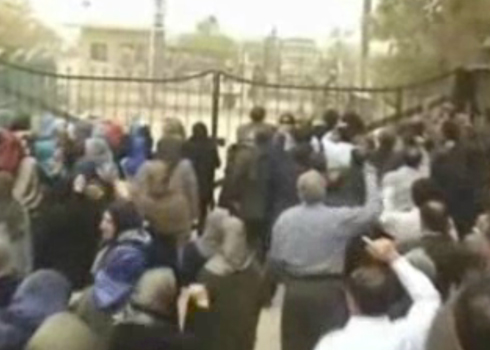The government of Iraq voted on Monday to shut down Camp Ashraf, home to members of the Iranian dissident group Mujahedin-e Khalq, or MEK. The move comes a few days after a deadly clash at the camp, which prompted criticism of Iraq from the State Department, the United Nations and others.
The U.S. State Department classifies the MEK as a foreign terrorist organization. But, as TPM has reported, the group has a history of support from American officials, which has been recently stepped up.
Iraqi government spokesman Ali al-Dabbagh told the Associated Press on Monday that MEK members “need to leave Iraq by the end of the year.”
“We have to find a nation where they can go, and we will look to the U.N. to help,” al-Dabbagh said.
There are conflicting reports about what sparked the clash at Ashraf on Friday, but the MEK says that 34 of its members have died, and hundreds were wounded in the incident. The group has called the event a “massacre,” releasing numerous videos that it says show the dead and injured. Hospital officials in a nearby town, meanwhile, told the AP that it counted 12 dead and 39 wounded.
al-Dabbagh, the Iraqi government spokesman, told The New York Times on Friday that MEK members had thrown stones at soldiers, and the “reaction to them was very normal and does not violate the law.” A section of the camp was reportedly taken by Iraqi troops, and turned over to Iraqi farmers.
Defense Secretary Robert Gates, who was visiting Iraq at the time of the incident, told reporters on Friday he was “concerned with reports of deaths and injuries.” Gates urged the Iraqi government “to show restraint and live up to their commitments to treat Ashraf residents in accordance with Iraqi law and international obligations.”
The State Department issued an even stronger statement. Acting Deputy Spokesman Mark Toner said the U.S. government “is deeply troubled by reports of deaths and injuries resulting from this morning’s clash at Camp Ashraf.”
“Although we do not know what exactly transpired early this morning at Ashraf, this crisis and the loss of life was initiated by the Government of Iraq and the Iraqi military,” Toner said. “The U.S. Embassy, United States Forces-Iraq, and United Nations Assistance Mission for Iraq are in regular contact with Iraqi officials at the highest levels to repeatedly urge them to avoid violence and show restraint.”
Over the weekend, the Iraqi government blocked the U.S. military from providing medical assistance to the camp, and Reporters Without Borders issued a statement denouncing the Iraqis for enforcing what the group called a “news blackout.”
“The security forces are denying journalists access to the camp to hide abuses committed against civilians,” the statement said. “Anyone trying to take photographs of the clashes is being attacked in a systematic and targeted fashion.”
Reports on Monday indicated that a U.S. medical team was allowed access to the camp.
Camp Ashraf has been a delicate diplomatic issue for some time. The MEK is listed as a foreign terrorist organization by the State Department, and ended up in Iraq in the mid-1980s, after being offered asylum by Saddam Hussein. According to the State Department, Hussein armed and funded the group, and the MEK fought on the Iraqi side of the Iran-Iraq war. The group is credited with killing numerous Iranian officials over the years, and the State Department states that the group killed Americans in Iran before the fall of the Shah in 1979. (The group now blames the killing of Americans on a splinter group.) The U.S. disarmed the MEK after the 2003 invasion of Iraq, and eventually consolidated the group at Ashraf, where 3,400 still live. The group now claims to have renounced violence.
A number of former military, government and intelligence officials have recently given speeches at pro-MEK events, where they have urged the State Department to delist the group. They’ve called for the protection of Ashraf and portrayed the MEK as critical to any chance of regime change in Iran.
The Iraqi government, which took responsibility for the camp in 2009, has long expressed an interest in expelling the group.
According to the AP, U.N. High Commission on Refugees spokesman Andrej Mahecic said said the Ashraf residents “could individually apply for refugee status, which would help them find a permanent home. But to do so, each exile would have to personally renounce violence as a means of achieving their goals — which he said the Ashraf residents have refused to do.”
Read the rest here.










